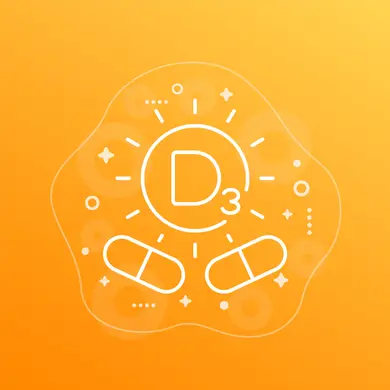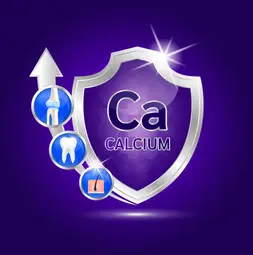Neurological symptoms of Vitamin D deficiency

Neurological symptoms of Vitamin D deficiency
Posted on 13th Feb, 2023
Vitamin D deficiency has been linked to several neuropsychiatric disorders and is believed to impact them through mechanisms such as neuronal apoptosis and the association with neurotrophic factors. Neuronal apoptosis is caused by the reduction of cytochrome C expression and the slowing of the neuron cell cycle, while neurotrophic factors are proteins that play a role in the growth and survival of neurons.
Lets take a closer look at the neurological symptoms of Vitamin D deficiency:
Alzheimers disease
Alzheimer's disease, which is known for the loss of cortical functions like language and motor skills, a shrinkage of the cerebral cortex and hippocampus, and an enlargement of the ventricles. Recent studies have found a connection between higher levels of vitamin D and a reduced risk of developing Alzheimer's disease.
Parkinsons disease
Parkinson's disease is a progressive disorder that affects movement and coordination, and is caused by the loss of dopaminergic (DA) neurons in the substantia nigra, a brain region involved in functions such as reward, addiction, and movement coordination. Research suggests that low levels of vitamin D may play a role in Parkinson's disease, and in one study, taking vitamin D supplements led to a reduction in symptoms.
Schizophrenia
Schizophrenia is a neuropsychiatric disorder marked by a disturbance in perceiving reality and thinking logically. The condition has both genetic and developmental causes. It is believed that vitamin D plays a role in brain development during pregnancy and its deficiency may contribute to the onset of schizophrenia.
Epilepsy and seizures
Seizures are disruptions in brain activity caused by abnormal neuron firing, while epilepsy is a condition characterized by recurrent seizures. A study showed that taking vitamin D supplements was associated with a reduction in seizures, while placebo treatment did not have the same effect. Vitamin D plays a role in regulating both proconvulsant and anticonvulsant factors, and has been shown to increase the expression of calcium-binding proteins, which have anti-epileptic properties.
Multiple sclerosis
Multiple sclerosis is an autoimmune disease that affects the central nervous system and causes damage to the myelin sheath, which is a fatty coating around nerve cells that facilitates the rapid transmission of nerve signals. In multiple sclerosis, the deterioration of the myelin sheath leads to a slowing of nerve signal transmission, resulting in serious motor problems.
Dosage
The recommended daily dosage of vitamin D varies depending on factors such as age, sex, and health status. The following are the recommended daily intakes for vitamin D, as per the Institute of Medicine:
- Infants 0-12 months: 400-1,000 IU
- Children 1-18 years: 600-1,000 IU
- Adults 19-70 years: 600-800 IU
- Adults over 70 years: 800-1,000 IU
- Pregnant or lactating women: 600-4,000 IU
However, it's important to note that some experts believe these recommended dosages may be too low, particularly for individuals who are at risk for vitamin D deficiency. It's always best to consult with a healthcare provider to determine the appropriate dosage for your individual needs.
Side Effects and Warnings
Possible side effects of taking high doses of vitamin D supplements include:
- Nausea, vomiting, and poor appetite
- Constipation or diarrhea
- Fatigue, weakness, and muscle pain
- Excessive thirst and increased urination
- Confusion and disorientation
- High blood pressure
- Kidney damage
- Increased risk of falls and fractures in older adults
It's important to note that taking too much vitamin D over a long period of time can lead to a condition called vitamin D toxicity, which can be serious and even life-threatening.
Warnings:
- People with certain medical conditions, such as kidney disease, liver disease, or high blood calcium levels, should not take high doses of vitamin D without first consulting a healthcare provider.
- Vitamin D can interact with certain medications, including corticosteroids, cholesterol-lowering drugs, and some anticonvulsants, so it's important to talk to a doctor or pharmacist before taking vitamin D supplements if you're taking any medications.
- It's also important to be aware that vitamin D supplements can interact with some herbal supplements, such as St. John's wort, so it's best to check with a healthcare provider before taking any supplements together.
Conclusion
In conclusion, vitamin D is an essential nutrient that plays a critical role in the body's overall health and wellbeing. It helps to regulate calcium and phosphate levels, which are important for healthy bones, teeth, and muscles. Vitamin D deficiency can lead to a variety of health problems, including rickets in children and osteomalacia in adults.
While it is possible to get vitamin D from sunlight and food sources, many people do not get enough of this important nutrient. In these cases, vitamin D supplements may be beneficial, but it is important to take them in the recommended dosages and to talk to a healthcare provider before starting any new supplement regimen.
Like all supplements, there are potential side effects and warnings associated with vitamin D supplementation. These may include gastrointestinal issues, kidney problems, and interactions with other medications. Therefore, it is important to use vitamin D supplements cautiously and under the guidance of a healthcare provider.

Health articles from our experts

Signs & Symptoms Of Vitamin D Deficiency In India

Signs & Symptoms Of Calcium Deficiency

10 Sources Of Vitamin D For Vegetarians

Top 10 Benefits of Ashwagandha Leaves

Top 5 Vitamin D Fruits and Vegetables You Should Know

Neurological symptoms of Vitamin D deficiency

10 Fruits rich in Vitamin K

Benefits of Ashwagandha for Men

Signs and Symptoms of a Chromium deficiency

